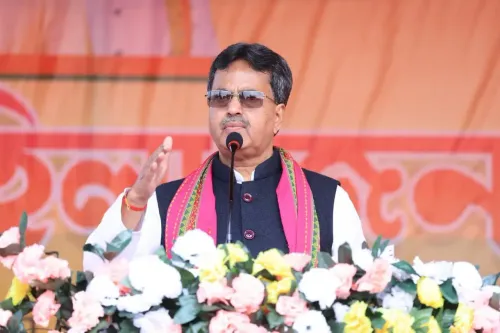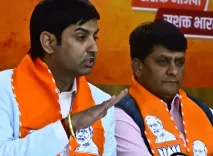Why Did the Court Dismiss Satyendar Jain's Defamation Case Against Bansuri Swaraj?

Synopsis
Key Takeaways
- Court dismisses Satyendar Jain's defamation case.
- Lack of malicious intent cited as primary reason.
- Statements made by Swaraj were based on ED's disclosures.
- Legal implications for political discourse are significant.
- Importance of substantiating claims in defamation cases.
New Delhi, July 31 (NationPress) In a significant blow to former Delhi Minister and AAP leader Satyendar Jain, a Delhi court on Thursday ruled against his defamation complaint directed at BJP's New Delhi MP Bansuri Swaraj, citing insufficient grounds for jurisdiction.
Special CBI Judge (Prevention of Corruption Act) Jitendra Singh stated, "No adequate grounds exist for invoking jurisdiction to consider this matter as outlined and punishable under Section 356 of BNS. Hence, the revision petition is dismissed."
"Without any evidence indicating malicious intent, it cannot be reasonably concluded that the proposed accused acted with the purpose of defaming or slandering the complainant," the court remarked.
The Special Judge's ruling effectively overturned Jain's appeal against an earlier trial court decision from February, which had also refused to acknowledge the defamation claim against Swaraj.
Jain, who faces multiple corruption allegations, accused Swaraj of making defamatory remarks during a news channel interview aired on October 5, 2023, intending to damage his reputation and gain an unfair political advantage.
The former Delhi Health Minister's complaint filed in the Rouse Avenue Court claimed that Swaraj labeled him as corrupt and alleged that cash and gold were recovered from his home.
Jain maintained that Swaraj's statements were made with "malicious intent to defame him and secure undue political advantage."
He specifically alleged that Swaraj's comments regarding an Enforcement Directorate raid at his residence claimed that ₹3 crore in cash and 1.8 kg of gold along with 133 gold coins were seized.
In response, Swaraj's legal counsel countered Jain's claims, asserting that the statements attributed to her simply reiterated information already available to the public from the ED's official communications via verified social media accounts.
Swaraj asserted that she neither fabricated nor misrepresented any facts, nor did she create any new content.
"The statements merely reflect and restate the contents of the ED's official disclosure. In the absence of any intentional misrepresentation or malicious intent, she cannot be held accountable for the alleged defamation," the MP's counsel argued.
The BJP MP added, "Should any statement be viewed as defamatory, the responsibility, if any, rests with the ED, which initially circulated the information. As a secondary communicator of officially released material, she cannot be assigned criminal liability, particularly in the absence of intent to harm the complainant's reputation."
The Special Judge noted in the order, "The statement attributed to the proposed accused is a verbatim restatement of a tweet published by the ED through its official social media handle."
The proposed accused did not fabricate facts nor disseminate misleading information; rather, the statement in question simply reproduces what was officially communicated by the ED, the judgment stated.
"There is no evidence presented that the proposed accused had any independent obligation or means to verify the truthfulness of the content, especially since the tweet pertains to investigative findings from an ED search," the Special Judge concluded.










